12 start with A start with A
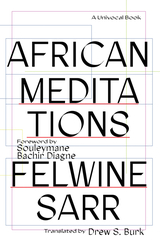
An influential thinker’s fascinating reflections and meditations on reacclimating to his native Senegal as a young academic after years of study abroad
The call to morning prayer. A group run at daybreak along the Corniche in Dakar. A young woman shedding tears on a beach as her friends take a boat to Europe. In African Meditations, paths to enlightenment collide with tales of loss and ruminations, musical gatherings, and the everyday sights and sounds of life in West Africa as a young philosopher and creative writer seeks to establish himself as a teacher upon his return to Senegal, his homeland, after years of study abroad.
A unique contemporary portrait of an influential, multicultural thinker on a spiritual quest across continents—reflecting on his multiple literary influences along with French, African Francophone, and Senegalese tribal cultural roots in a homeland with a predominantly Muslim culture—African Meditations is a seamless blend of autobiography, journal entries, and fiction; aphorisms and brief narrative sketches; humor and Zen reflections.
Taking us from Saint-Louis to Dakar, Felwine Sarr encounters the rhythms of everyday life as well as its disruptions such as teachers’ strikes and power outages while traversing a semi-surrealistic landscape. As he reacclimates to his native country after a life in France, we get candid glimpses, both vibrant and hopeful, sublime and mundane, into his Zen journey to resecure a foothold in his roots and to navigate academia, even while gleaning something of the good life, of joy, amid the struggles of life in Senegal.
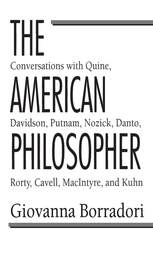
Giovanna Borradori, in her substantial introduction, explains the history of the analytic movement in America and the home-grown reaction against it. In the late nineteenth and early twentieth centuries, American philosophy was a socially engaged interdisciplinary enterprise. In transcendentalism and pragmatism, then the dominant currents in American thought, philosophy was connected to history, psychology, and public issues. But in the 1930s, the imported European movement of logical positivism redefined philosophical discourse in terms of mathematical logic and theory of language. Under the influence of this analytic view, American philosophy became a professionalized discipline, divorced from public debate and intellectual history and antagonistic to the other, more humanistic tradition of continental thought.
The American Philosopher explores the opposition between analytic and continental thought and shows how recent American work has begun to bridge the gap between the two traditions. Through a reexamination of pragmatism, and through an attempt to understand philosophy in a more hermeneutical way, the participants narrow the distance between America's distinctly scientific philosophy and Europe's more literary approach.
Moving beyond classical analytic philosophy, the participants confront each other on a number of topics. The logico-linguistic orientations of Quine and Davidson come up against the more discursive, interdisciplinary agendas of Rorty, Putnam, and Cavell. Nozick's theory of pluralist anarchism goes face-to-face with the aesthetic neo-foundationalism of Danto. And Kuhn's hypothesis of paradigm shifts is measured against MacIntyre's ethics of "virtues."
Borradori's conversations offer an unconventional portrait of the way philosophers think about their work; scholars and students will not be its only beneficiaries, so will everyone who wonders about the current state of American philosophy.
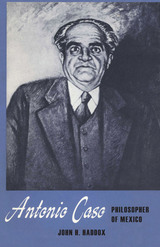
Few men have had as much cultural and educational influence on their own countries as the philosopher and educator Antonio Caso (1883-1946). He was above all a patriot of his beloved Mexico, and he sought to deliver his humanitarian message to his countrymen.
In his youth, after the revolt against Díaz, he was a member of the Ateneo de la Juventud, a group that sought to bring Mexico, spiritually and economically, back to the Mexicans. Caso realized that this effort involved the forming of a national consciousness among his people, whom he saw divided by their private and public interests.
As an educator of Mexican youth for more than thirty years, Caso sought to imbue in his students the desire to search and to question. He saw education as a perpetual search for truth, and his own life and philosophy reflect this search. He rejected any system that proposed to describe all of reality, and he despised all dogmas—official or unofficial. He particularly fought against positivism and Marxism, systems current in his youth.
The first part of this book is an introduction to the philosophical and educational ideas of Caso, as well as to the intellectual and political ideas in his life. Mr. Haddox skillfully shows the development of Caso's ideas and how they took shape from his own reading as well as from the experiences of his age and of his country. The second part contains Mr. Haddox's translations of selections from Caso's writings. They give a moving picture of Caso's hopes for Mexico and for humanitiy.

The life and miracles of a pagan holy man.
This biography of a first-century AD holy man has become one of the most widely discussed literary works of later antiquity. In a grandly baroque style style Philostratus portrays a charismatic teacher and religious reformer from Tyana in Cappadocia (modern central Turkey) who travels the length of the known world, from the Atlantic to the river Ganges. His miracles, which include extraordinary cures and mysterious disappearances, together with his apparent triumph over death, caused pagans to make Apollonius a rival to Jesus of Nazareth.
In his three-volume Loeb edition of this third-century work, Christopher Jones gives a much improved Greek text and an elegant translation with full explanatory notes. The Life of Apollonius is formally a biography (by far the longest that survives from antiquity), but in reality a combination of travel narrative, rhetorical showpiece, and much else. In the introduction, Jones addresses the question of how far the Life is history and how far fiction. He also discusses the survival and reception of the work through Late Antiquity and up to modern times, and the role that it continues to play in controversies about Christianity.

The life and miracles of a pagan holy man.
This biography of a first-century AD holy man has become one of the most widely discussed literary works of later antiquity. In a grandly baroque style style Philostratus portrays a charismatic teacher and religious reformer from Tyana in Cappadocia (modern central Turkey) who travels the length of the known world, from the Atlantic to the river Ganges. His miracles, which include extraordinary cures and mysterious disappearances, together with his apparent triumph over death, caused pagans to make Apollonius a rival to Jesus of Nazareth.
In his three-volume Loeb edition of this third-century work, Christopher Jones gives a much improved Greek text and an elegant translation with full explanatory notes. The Life of Apollonius is formally a biography (by far the longest that survives from antiquity), but in reality a combination of travel narrative, rhetorical showpiece, and much else. In the introduction, Jones addresses the question of how far the Life is history and how far fiction. He also discusses the survival and reception of the work through Late Antiquity and up to modern times, and the role that it continues to play in controversies about Christianity.

The life and miracles of a pagan holy man.
Philostratus' colorful biography of Apollonius of Tyana, recounting the sayings and miracles of a Pythagorean sage, incidentally provoked a long-lasting debate between pagans and Christians. This volume, which completes the Loeb Classical Library edition of the Life of Apollonius of Tyana, provides full context for that much discussed third-century portrayal of a charismatic religious teacher.
Here is a new translation of the surviving letters of Apollonius, augmented and illuminated by recent discoveries. These letters reveal Apollonius' personality and his religious and philosophical ideas. New for this edition is a selection of ancient reports about Apollonius from authors such as St. Jerome and St. Augustine.
Philostratus' biography was quickly caught up in the religious struggles that marked the rise of Christianity. An official in Diocletian's empire named Hierocles used it as ammunition in an anti-Christian polemic, initiating a controversy that lasted well into modern times. The reply by Eusebius, the fourth-century bishop of Caesarea, was originally included in editions of the Life of Apollonius in order to serve as a spiritual antidote and to provide cover for the publishers; today it is an essential chapter in the history of Philostratus' masterpiece.
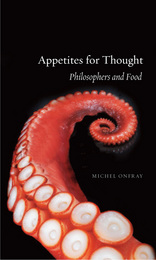
Tracing the edible obsessions of philosophers from Diogenes to Sartre, Onfray considers how their ideas relate to their diets. Would Diogenes have been an opponent of civilization without his taste for raw octopus? Would Rousseau have been such a proponent of frugality if his daily menu had included something more than dairy products? Onfray offers a perfectly Kantian critique of the nose and palate, since “the idea obtained from them is more a representation of enjoyment than cognition of the external object.” He exposes Nietzsche’s grumpiness—really, Nietzsche grumpy?—about bad cooks and the retardation of human evolution, and he explores Sartre’s surrealist repulsion by shellfish because they are “food buried in an object, and you have to pry them out.”
A fun romp through the culinary likes and dislikes of our most famous thinkers, Appetites for Thought will intrigue, provoke, and entertain, and it might also make you ponder a bite to eat.
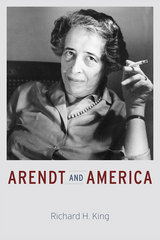
Situating Arendt within the context of U.S. intellectual, political, and social history, King reveals how Arendt developed a fascination with the political thought of the Founding Fathers. King also re-creates her intellectual exchanges with American friends and colleagues, such as Dwight Macdonald and Mary McCarthy, and shows how her lively correspondence with sociologist David Riesman helped her understand modern American culture and society. In the last section of Arendt and America, King sets out the context in which the Eichmann controversy took place and follows the debate about “the banality of evil” that has continued ever since. As King shows, Arendt’s work, regardless of focus, was shaped by postwar American thought, culture, and politics, including the Civil Rights Movement and the Cold War.
For Arendt, the United States was much more than a refuge from Nazi Germany; it was a stimulus to rethink the political, ethical, and historical traditions of human culture. This authoritative combination of intellectual history and biography offers a unique approach for thinking about the influence of America on Arendt’s ideas and also the effect of her ideas on American thought.
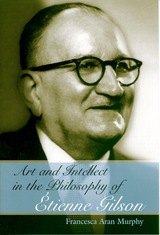
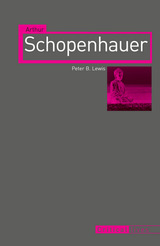

“It is quite incorrect to believe that the dead are gone forever and never return to speak to the living. They return to speak to the living all the time; indeed, it is their main activity.” Thus writes Sylvie Weil in this illuminating memoir, in which contemporary readers can hear the voices of her famed philosopher aunt Simone and mathematician father André.
Born into a freethinking Jewish family in France in 1909, Simone Weil was one of the twentieth century’s most original philosophers, influencing Albert Camus, T. S. Eliot, Simone de Beauvoir, Pope John XXIII, Czesław Miłosz, and Susan Sontag. She fought for workers’ rights and, later, the Spanish Republican cause. Before her death at age thirty-four, Simone Weil turned increasingly to mysticism and religion, especially Roman Catholicism, exploring themes of sacrifice, asceticism, and the virtues of manual labor. She never converted, however, and Sylvie Weil writes from a Jewish perspective, emphasizing Simone’s Jewish heritage.
Using previously unpublished family correspondence and conversations, Sylvie Weil paints the most vivid, private portrait of her aunt in print. The book illuminates Simone’s relationship with others, especially with her brother, André. Loving and unsparing, affectionate and incisive, At Home with André and Simone Weil is an insightful memoir about a family of intellectual luminaries.
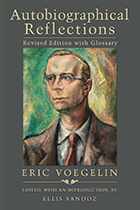
READERS
Browse our collection.
PUBLISHERS
See BiblioVault's publisher services.
STUDENT SERVICES
Files for college accessibility offices.
UChicago Accessibility Resources
home | accessibility | search | about | contact us
BiblioVault ® 2001 - 2024
The University of Chicago Press









